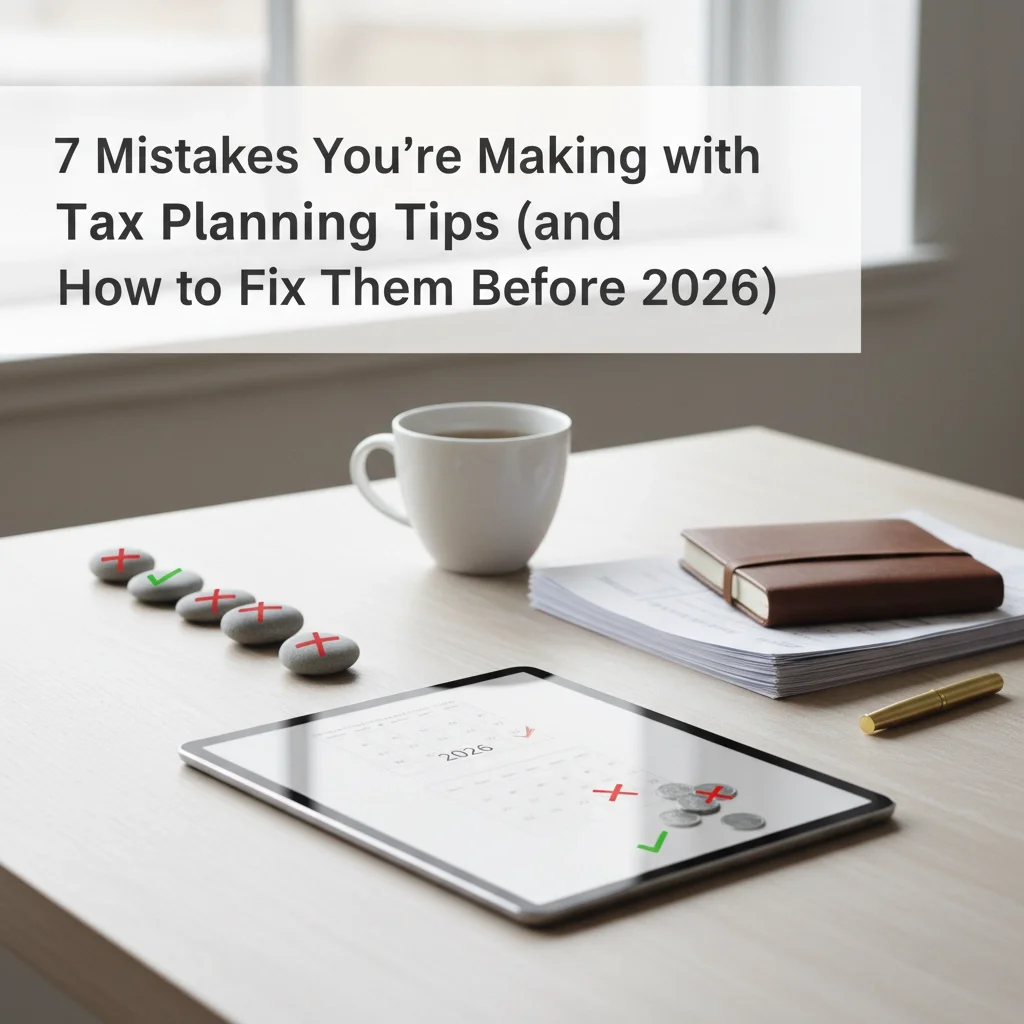7 Mistakes You're Making with Tax Planning Tips (and How to Fix Them Before 2026)
Tax season doesn't have to be a scramble. Yet every year, smart business owners make the same costly mistakes that drain their bank accounts and create unnecessary stress. With 2026 approaching fast, now's the time to fix these issues before they hit your bottom line again.
Here are the seven biggest tax planning mistakes we see entrepreneurs make: and the straightforward fixes that can save you thousands.
Mistake #1: Waiting Until March to Start Planning
Most business owners treat tax planning like cramming for a final exam. They wait until the last possible moment, then wonder why their options are so limited.
The problem: By March, you've already missed most of the year's tax-saving opportunities. Retirement contributions, equipment purchases, charitable giving strategies: they all have deadlines that passed months ago.
The fix: Start your tax planning in January, not March. Set quarterly check-ins with your accountant to review your tax situation and adjust strategies as needed. This gives you time to actually implement money-saving moves instead of just wishing you could.
Mistake #2: Keeping Terrible Records
"I'll remember that expense" is expensive thinking. Without proper documentation, you're leaving money on the table and setting yourself up for problems if the IRS comes knocking.
The problem: Poor record-keeping means missed deductions, time wasted hunting for receipts, and potential audit headaches. Small business owners especially lose track of legitimate business expenses that could significantly reduce their tax burden.
The fix:
Use accounting software that connects to your bank accounts
Take photos of receipts immediately and store them digitally
Keep separate business and personal accounts
Review and categorize expenses monthly, not yearly
The few minutes you spend staying organized each month will save you hours of frustration and potentially thousands in missed deductions.
Mistake #3: Getting Tax Withholding Wrong
Either you're giving the government a free loan, or you're setting yourself up for a nasty surprise come tax time.
The problem: Large refunds mean you over-withheld: that's your money that could have been working for you all year. Owing thousands at tax time creates cash flow problems and potential penalties.
The fix: Review your withholding and estimated tax payments quarterly. Aim to owe between $0-$1,000 at year-end. If you're self-employed, set aside 25-30% of your income for taxes in a separate account.
Mistake #4: Ignoring Retirement Contributions
This is free money you're walking away from. Retirement contributions reduce your current tax bill while building your future wealth.
The problem: Many business owners focus so much on their business that they forget about their own retirement. They miss out on immediate tax deductions and long-term compound growth.
The fix for 2025:
SEP-IRA: Contribute up to 25% of income or $70,000, whichever is less
Solo 401(k): Contribute up to $70,000 ($77,500 if 50 or older)
Traditional IRA: $7,000 ($8,000 if 50 or older)
Make these contributions before the tax deadline to reduce your 2025 tax bill.
Mistake #5: Missing Business Deductions
The tax code rewards business owners with dozens of legitimate deductions. Not claiming them is like throwing money away.
The problem: Business owners either don't know what's deductible or don't track deductible expenses properly. Common missed deductions include home office expenses, business meals, professional development, and equipment purchases.
The fix: Work with a tax professional who understands your industry. Common business deductions include:
Home office expenses (if you work from home)
Business meals (50% deductible)
Professional development and training
Business equipment and software
Travel expenses
Marketing and advertising costs
Keep detailed records and when in doubt, ask your accountant.
Mistake #6: Not Having a Tax Strategy
Filing taxes isn't tax planning. Real tax planning means making strategic decisions throughout the year to minimize your tax burden legally.
The problem: Without a strategy, you're reactive instead of proactive. You miss opportunities to time income and expenses, make strategic purchases, or implement tax-saving structures.
The fix:
Meet with your accountant quarterly to review your tax situation
Consider timing large purchases for maximum tax benefit
Evaluate if your business structure is still optimal
Plan charitable giving for maximum impact
Look at income timing opportunities near year-end
Mistake #7: Doing It All Yourself (When You Shouldn't)
DIY tax software has its place, but complex business situations require professional expertise.
The problem: Business owners often underestimate the complexity of their tax situation. They use consumer software for business returns, miss industry-specific deductions, and make costly errors that trigger audits or penalties.
The fix: If your business has any complexity: multiple revenue streams, employees, significant equipment purchases, or you're claiming the home office deduction: work with a qualified business accountant.
The money you spend on professional help typically pays for itself in tax savings and peace of mind.
Your 2026 Tax Planning Action Plan
Don't let another year go by leaving money on the table. Here's what to do right now:
Before December 31, 2025:
Schedule a tax planning meeting with your accountant
Review and maximize retirement contributions
Organize your business expense records
Consider any equipment purchases or business investments
Plan charitable giving for maximum tax benefit
Starting January 2026:
Implement a monthly bookkeeping routine
Set up quarterly tax planning meetings
Establish separate accounts for tax savings
Review your business structure for optimization
The Bottom Line
Tax planning isn't about finding loopholes: it's about legally minimizing your tax burden through smart, strategic decisions made throughout the year. The business owners who pay the least in taxes aren't the ones who get lucky at filing time. They're the ones who plan ahead.
Every dollar you save in taxes is a dollar that stays in your business to fuel growth, hire employees, or build your personal wealth. The question isn't whether you can afford to invest in proper tax planning: it's whether you can afford not to.
Ready to stop making these expensive mistakes? The best time to start planning for 2026 was yesterday. The second-best time is right now.
Need help creating a tax strategy that actually saves money? ARC Business Advisors specializes in helping business owners minimize their tax burden while staying compliant. Contact us today to schedule your tax planning consultation.





